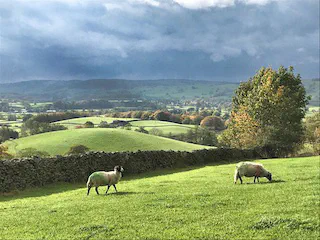
Is life healthier outside of cities?
- Matthieu P.J.
- Wellbeing
- October 31, 2021
The Coronavirus crisis has triggered some people to depart dense and overpopulated urban areas for suburbs—or even rural areas—in search for more space, affordable housing and a more balanced lifestyle. That trend goes against the rural exodus which have instead led many to abandon rural areas and converge towards cities in the 20th century.
Today, it is estimated that more than half of mankind lives in cities. According to the World Economic Forum:
Overall, more people in the world live in urban than in rural setting since 2010. In 2020, 56.2 percent of the world population was urban. Half of these people lived in towns of less than 500,000 inhabitants.
But the migratory pattern that yesterday seemed to be synonymous of a better life may nowadays simply be a bad idea…
Table of Contents
History lesson
It’s not because today many believe it’s desirable to live in urban areas that we should take it for something normal. History teaches us otherwise. In fact, prior to the Industrial Revolution of the 19th century, it was the norm to live outside of cities. For example, the United Kingdom went from having 20% of the population living in urban areas in 1800 to more than 70% by 1925.1
Rural exodus 2 is something recent. It only became possible once some major road blockers—that used to make cities unattractive to the crowds—were removed, such as low food supplies and limited employment. The model of the factory employing lots of people was something new brought by the Industrial Revolution. The industrialisation of agriculture also meant there was less work in farms because it required less people to produce a similar quantity of food.
Therefore, in the 21st century, we may have a sense that cities are attractive but it’s something rather recent in the history of mankind.
Covid aftermath
In line with the Industrial Revolution shift, nowadays cities provide an abundance of office jobs for modern workers. Most offices are located in city centres nearby transport hubs and it had become the norm to commute to an office. At least, till Covid hit the world.
But necessity sometimes has unexpected consequences… For many firms that were reluctant to have their employees working fully remotely, they just had to make do with it during the coronavirus crisis. And what did they discover? Well, far from the dreaded lack of commitment from their staff, they found out for the most part that not only work was done with quality and on time, but that people were more productive because they had more free time available (on average a 2-hours-a-day bonus representing their past commute). The result? Many companies now have plans to let go of a significant proportion of their rental space in city centres and workers will have anonymous hot desks they can use whenever they visit. You could argue this was purely motivated by financial gains though. Yet, the lasting impact of Covid on working habits should not be underestimated.
Granted, social interactions in real life goes a long way, but the quality of life is important too. So much so that quite a few people who already had their doubts about living in centres or suburbs of large cities have actioned their plans and finally left to settle near smaller cities, towns or even rural areas. I’ve seen people around me leave London for Brighton for example. That does not mean it is for everyone, but still what those people felt is that in this new context they did not see enough good reasons to stay where they use to live.
Weighing the pros and cons
And that begs the question: what do you get out of the life in cities? It will obviously depend on your age. As a young adult, you may get attracted by the dynamism of city like London, its night life, the constant flow of events taking place.
When you are older, it may be more about art galleries, museums, musicals, theatres etc. Yet I recall clearly reading about those people leaving London behind because it had become ridiculous to live there. Generally that was somehow related to them having kids and facing hefty expenses. They simply had no valid reason to stay.
When your source if income is located in a city centre and you want to ease the pain of your commute, you have an incentive to stay close to the centre—at least if you can afford it. But what about the cons?
And that is when a list that may seem small or just irrelevant when you’re young carefree and thrilled by action can start to take form:
- Life is expensive in cities, especially housing
- There is limited space available, you are packed in public transports, roads are impractical for driving without traffic sometimes simply ridiculous
- It’s noisy, often dirty, sometimes even smelly
- It’s rather agressive for your physical senses: commercials of all sorts in high traffic areas for your eyes, public announcements in transport hub for your ears, people bumping into you on the pavement because they look at their smartphone for your sens of touch.
- There’s poverty around you yet an abundance of wealth: the extremes meet. The homeless next to the wealthy.
- It’s just busy—and you simply can’t turn that off
And there’s a last item—that has become personally a very serious one—that I call energetic contamination.
Energetic patterns
The energy of others impacts you more than you think. Everyone has a certain sensitivity to energy but when you are an empath, things are magnified. You walk down the streets and you can feel people’s emotion coming at you. You’re bathing in an energetic soup, each city having its own unique recipe—its energetic signature.
When I visit cities I often notice familiar patterns: I see a lot of people who are there to work and radiate the energy of someone who feels miserable. I can feel how much they are unhappy with their life and the job that drags them to the very centre of cities. They seem lost, victims of a system that is beyond their comprehension. They just have to be there. They are the modern cheap labour on which cities thrive. Because for some to become wealthy, other have to do the grunt work. Usually people from remote part of the country, or even foreigners. Whatever city you go to, you’ll see the same pattern. The young and naive new comers, in search for a better life, soon crushed and abused by a merciless and aggressive system not to say brutal. That, is also the reality of modern cities.
Cities have become overwhelming for me. As humanity awakens to higher levels of planetary energy, I know and I feel that cities will become a very difficult place to live in. The close proximity of so many human beings creates a collective energy that is influencing your mood, emotions and behaviours at every moment—something that most of us are totally unaware of. And that energy is difficult to handle in normal times, let alone in periods of intense transformation as we’ve now entered.
Any large urban area creates an energetic vortex that is felt for miles around. The bigger the population in that area, the more dramatic the effect is. As an example, I can feel I have left the London vortex when I’ve crossed the M25 border because the energy thickness drops a level. It is that perceptible for me now. At the same time, after spending a day out in the countryside and coming back to London I can feel a drop in energy and it affects me. I feel the aggressiveness of other drivers on the road, the sense of recklessness, selfishness, and restlessness of people in their cars. I find myself falling back into negative patterns and emotions more easily. In public transport and social venues, I see a lot of people frantically looking at their smartphone interspersed with hectic moves of the fingers to scroll down what is presumably a social media page, treating each other as a stranger but looking for a connection to the world through a LCD screen a few inches wide. And I can’t help wonder: is that what our civilisation has become? The real world is there, in front of your eyes, if only you look at it!
Time for different desires—and choices
Like many people, my livelihood has become relatively decoupled from a physical location in urban centres—call it a gift from Covid if you wish. I’ve had to re-evaluate the relevance for me to stay in the vicinity of a large city. And to be fair, I don’t see enough reasons to do it any longer.
For people in similar situations, what often justifies to stay in cities is: the workplace of a partner; family arrangements (siblings, parents, schooling etc.); the social life with lots of friends in the same area; and a sense of familiarity for a place where you’ve lived long enough. But otherwise it is a weak case.
So, how about you, is it time to challenge the place where you live now?
Fortunately, people have different tastes in lifestyle and places to live which means not everybody will abandon cities—at least in the short/medium term. In fact, it is difficult to know what the real trend is in terms of migratory patterns. Because according to certain observers, “after shedding residents through much of the pandemic, cities are bouncing back”3 It’s too early to draw conclusions, but it’s the perfect time to think seriously about what we want at an individual level.
Do we want larger houses with garden because we’ve been traumatised by staying confined to ridiculously small and expensive flats in cities in the name of tasting the urban lifestyle? Do we want greenery and the woods or beach nearby so we can reconnect with nature? Do we want to drive 50 miles in an hour and really get somewhere different instead of doing just 4 miles in traffic? Do we want to let go of the energetic weight of cities that make us much more impacted by the thoughts and emotions going through the collective unconscious?
On the last point, my conviction is that the coronavirus crisis has just heralded a series of deep and systemic changes in our societies and that the next episodes will stretch once more the limits of what we think is achievable collectively. Ladies and gentlemen, fasten your seat belts!
Better health outside of dense cities
For the many reasons I already outlined, I believe that living on a permanent basis in a city or its near vicinity has some harmful effects on human beings. That takes place at the physical and energetic levels (e.g. emotions). People may not be perceptive of this, especially if they’ve always lived in urban areas. Think of it as a poison that you get everyday so you build up tolerance. Only if you remove the exposure to the daily poison, do you realise that your baseline was not healthy.
An easy way to find out is: when you travel outside the city where you live, do you feel higher levels of energy? Sleep better? Have an elevated mood? This is a bit hard to pinpoint because if you leave your residential area only for a vacation you’re naturally prone to feel better! But with a bit of experimentation you may be able to really find out for yourself. Basically, you may realise there is a price to pay at the health level for the ‘privilege’ to live in a city. And I’m not even getting onto the topic of EMFs4 and how they’ve saturated urban areas, or the controversial effects of 5G.
The phenomenon of energy exchange between people works at a subtle level, something mainstream modern science has not yet on its radar. So only you can find out what are the healthy choices for yourself, but it would be naive to believe that the density of the population in the area where you live has no impact.
Is the age of cities over?
Cities will remain attractive because of the historical heritage they represent and as a hub for gatherings (because of existing transport infrastructure). For that, they are appropriate. However having a constant large base population living in them or nearby is the real point that needs to be examined.
I am not saying cities are intrinsically bad, but that a lot of negative things are magnified by the energy of cities (that is: the combined energy of all the people who live there). And in a time of global turmoil, there will be sparks of emotional distress and whoever lives in urban areas will feel the waves at the energetic level. At the physical level, they will be at the forefront of the events (e.g., unrest in the streets).
I believe that the golden age of cities is over though. I believe we will witness a decline in the attractiveness of permanent urban lifestyle. I believe the answer for our collective future lies in small, self-organised and self-sufficient communities. What will enable them is the possibility to secure supplies of bare necessities: the trio of food, water and energy. The later will play a crucial role for independence and will require innovations and the release of new technologies. All the rest is dependent on that trio. And there is also another important factor: land.
I believe people working on these themes will bring us the tools to do that. May it be permaculture, new technologies for energy production 5 and energy savings. Equally important, we will need new mindsets to live in harmony with nature and among people for whom we truly care. Not just living as strangers next to each other in large cities for which we lack real identification with. Instead, a real sense of belonging will make communities blossom.
Our lives cannot change till we make different decisions and re-assess our lifestyles in the light of new circumstances. If any of the signs I described in this article echoes within you, ask yourself: “what do I want from the place I live in?” and “where do I feel I belong?” Because you have the power to change that one thing in your life that influences a lot overall: the place where you live.
source: Wikipedia ↩︎
also called rural flight ↩︎
according to Business Insider ↩︎
electric and magnetic fields ↩︎
something that many whistle-blowers have spoken about, saying revolutionary technologies have been deliberately withheld from the masses in an attempt to enslave the human collective. Nikola Tesla who died nearly 80 years ago now was thought for example to have invented devices allowing the generation of unlimited free energy. ↩︎


